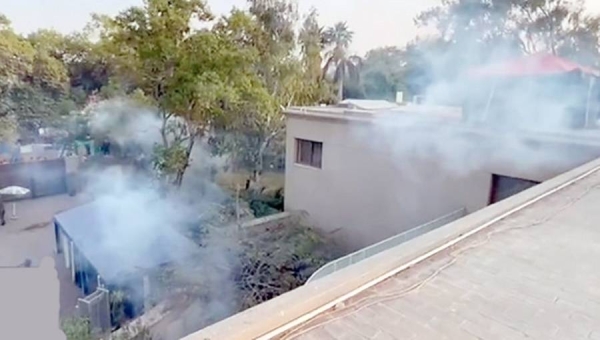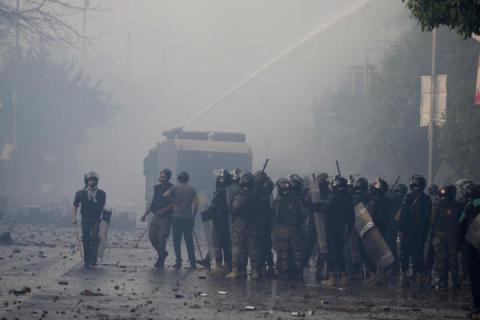
Hundreds of police officers equipped with teargas hurriedly took positions near a junction connecting Islamabad with its twin city of Rawalpindi as a group of protesters burned wood and chanted slogans on Friday.
The two groups edged towards each other, and then the protesters hurled stones at the police, who responded with teargas rounds. Not long afterwards, the protesters dispersed, and police reopened the junction to traffic.
The brief flashpoint was one of many in cities across Pakistan – including Lahore and Karachi – as supporters of Imran Khan took to the streets after an assassination attempt on the former prime minister.
The attack on Khan’s convoy on Thursday killed one man and wounded at least 10, significantly raising the stakes in a political crisis that has gripped the south Asian nation since Khan was ousted from power in April.
In a rambling address given from a wheelchair in hospital in Lahore on Friday, Khan accused his successor, Shehbaz Sharif, the interior minister, Rana Sanaullah, and a senior army commander of involvement in a plot to kill him. “These three decided to kill me,” Khan said in his first public appearance since Thursday’s attack, adding that two gunmen were involved.
He offered no evidence for his claims and the government has denied any involvement, blaming the assassination attempt on a gunman fuelled by religious extremism. Sharif led a coalition of parties that removed Khan from power through a parliamentary vote in April.
Eighteen-year-old Ali Sher was among the protesters chanting, “What do we want? Freedom” in Rawalpindi on Friday. “We want freedom from corrupt politicians and we won’t leave until Shehbaz Sharif resigns,” he said as he waved a flag with Khan’s picture on it.
Echoing Khan’s comments, Sher claimed Sharif was behind the attack as part of what he described as a conspiracy to keep Khan out of office. “They wanted to kill him, but his attack is not going to kill our spirit for freedom,” Sher said.
The 70-year-old Khan, a former international cricket star, had been leading a campaign convoy of thousands since last week from Lahore to the capital Islamabad. Khan was looking out at the crowd when bullets were sprayed at his modified container truck as it slowly inched through a thick crowd in Wazirabad, about 105 miles east of Islamabad.
On Friday he reiterated a call for fresh elections, adding: “The revolution will come whether with peace or with bloodshed … I will call for the march towards Islamabad as soon as I recover fully.”
Khan said he was shot four times, twice in each leg. A doctor who was in the room with him said Khan was hit twice in the right thigh and twice in the left thigh, and that his left tibia had been fractured.
Noor Khan, a shopkeeper who had travelled a few hours from Nowshera to join the Rawalpindi protest, said: “I do not know much about politics but … Imran Khan, whatever he says, he is always right and I follow him. I do not care about my life, I will always follow Khan.
“There are protests in Nowshera too but I came here to protest against what happened to Khan and throw out this government.”
In the eastern city of Lahore, large groups of protesters burned tyres and blocked major roads. They also gathered outside the fortified office of the Punjab provincial governor and pelted the gate with stones, destroying security cameras and barriers. Protesters also blocked roads in the north-western city of Peshawar and in Karachi in the south. Since being forced to leave office, Khan has been rallying to demand early elections. He began a march to Islamabad last week after Pakistan’s election commission disqualified him from holding public office for five years for allegedly selling state gifts unlawfully and concealing assets. He has challenged the disqualification in a court and is waiting for a decision.
Sharif’s government has made it clear that elections will take place as per the schedule in 2023 and there will be no early elections.
Khan has blamed Pakistan’s powerful military and the US for ousting him in April, which both deny.
Shah Khalid, another Khan supporter in Rawalpindi, said the military should stop intervening in politics. “There must be civil supremacy in the country,” he said. “The future of this country should be decided by the masses, not through conspiracies and the military. It is enough.”
A soldier deployed from Pakistan’s border to maintain order at the protest site, who did not want to be named, urged Khan and Sharif to sit and down and negotiate in order to “stabilise” the situation. “They should take a reconciliatory path,” he said. “This madness must stop.”












